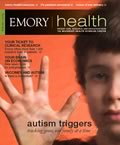Do vaccines cause autism?
 Amy Pakula is a developmental pediatrician at Emory and Marcus Autism Center. |
An Emory pediatrician follows the evidence
When a child is diagnosed with a neurodevelopmental disorder, it's understandable that parents sometimes ask what they could have done or not done during pregnancy, childbirth, or the baby's infancy. I spend a lot of time talking with families about the many possible causes about which they worry, many gleaned from the Internet. It is rewarding to be able to assure them that they are not at fault. The causes of these disorders are largely unknown, and therefore without currently recognized preventive measures.
Because of the extensive public awareness that surrounds autism, parents are less likely to look internally for a cause and more likely to look externally to diet, the environment, and especially, the vaccines that children receive. Concern over a possible role for vaccines in causing autism has immediate and potentially life-changing implications for children. Pediatricians must be well prepared and take the time to explain the science behind their decision—like my own—to recommend that children be immunized.
I explain to families that we are only at the beginning of understanding the basis of this puzzling disorder. Most scientists believe that many, if not most, forms of autism will turn out to be caused by a mixture of errant genes, a few that have a specific effect by themselves, some that must be present in a specific combination of mutations, and some that are susceptibility genes that require environmental triggers to activate changes that in turn produce autism.
Suggested readings
|
||
Could that have implications for vaccinations and autism? Could some component of the vaccines, the immune system’s reaction, or something not yet known play a role in the development of autism for at least a subset of children? Well, science is very conservative when it comes to saying that some factor could never play a role in some problem, especially with a growing understanding of individual variation and the clinical diversity of autism. Some do theorize that yet-to-be-determined environmental factors present in modern society may uniquely impact genetically susceptible individuals. It is quite clear that the current prevalence of autism spectrum disorders is high, and only a part of the explanation for this lies in the broader awareness of symptoms by both professionals and the public, or in the expansion of diagnostic criteria to include a broader variety of developmental, communication, and behavioral criteria.
That is why I support continuing research on many possible causes of autism, including vaccines. However, as a pediatrician, I don’t have the luxury of waiting to see if future studies continue to reinforce what previous studies already have found. Instead, like virtually all physicians, I must practice “evidence-based medicine.” That means I recommend that babies receive vaccines as recommended by the American Association of Pediatrics (AAP), NIH, and the CDC. Evidence is strong that vaccines have had and continue to have an enormous, truly miraculous impact on the health and survival of infants and children, including the prevention of diseases that can result in brain and other neurodevelopmental damage. And so far, according to a large and growing number of studies, no evidence exists for a causal relation between vaccines and autism.
In 2004, the Institute of Medicine (IOM) released a report by a committee of independent experts that had, at the request of the CDC and NIH, evaluated evidence on potential links between childhood vaccines and health problems. An earlier IOM report had found no association between vaccines and autism, but institute members believed more evidence was needed regarding thimerosal, a mercury-based compound previously used as a vaccine preservative. In larger dosages, mercury itself is known to cause neurologic damage. After reviewing five large studies in the United States, United Kingdom, Denmark, and Sweden along with 14 additional studies and information from parents and clinicians, the new IOM committee concluded that available evidence argues against the existence of a causal relationship between thimerosal-containing vaccines and autism.
It was an interesting time to look at these studies because of the changes in vaccines in recent years. Currently, to be as cautious as possible, all routinely recommended vaccines manufactured for U.S. infants are either thimerosal-free or contain only trace amounts, and the quantity of completely thimerosal-free vaccines increases yearly as manufacturing capacities expand. In some countries, such as Denmark, vaccines have had no thimerosal for years. But none of these changes have produced a decline in autism.
These findings, however, did not cause our nation’s leading research institutions to close the door on further investigation of a possible role for vaccines and autism. The CDC is conducting or supporting a number of studies conducted with the NIH, AAP, and academic and research institutions.
Where research can help
The need for more research into the epidemiology of autism is why I encourage families to participate in autism family databanks and research studies. They do so gladly.
The results of past and current research studies are why I continue to recommend that families get all recommended immunizations for their children. In our vaccine-rich society, we too often take for granted that our children will not get serious communicable diseases, but the recent outbreak of Hemophilus influenza type B (HIB), with its risk of meningitis leading to deafness and brain damage, shows how wrong this idea is. As a medical resident, before the HIB vaccine was developed in the 1990s, I saw the neurodevelopmental havoc, sometimes death, which this still-present bacterium could cause in infants and children.
Finally, the significant advances now being made in research, especially related to the genetic basis of some forms of autism, are why I am optimistic that eventually, sooner rather than later, we will better understand what really causes autism and consequently what we can do to both treat and prevent it. EH


